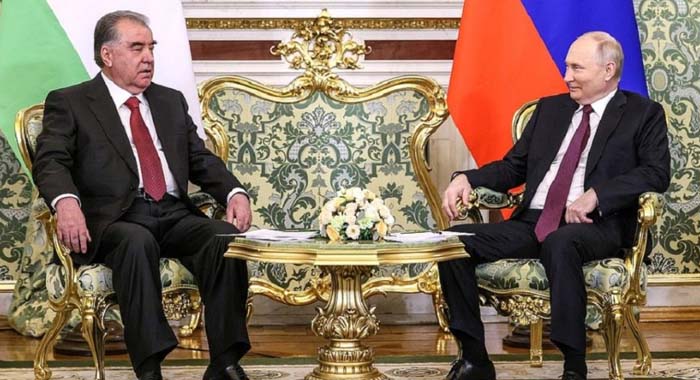Russian President Vladimir Putin will undertake an official visit to Tajikistan on October 9 for high-level discussions with President Emomali Rahmon, focusing on Afghanistan’s security situation, counterterrorism coordination, and broader regional stability, the Kremlin confirmed on Friday.
The visit underscores Moscow’s growing engagement with Central Asian partners amid mounting security concerns along the Afghanistan–Tajikistan border, where militant activity has reportedly intensified since the Taliban’s return to power in 2021.
Russian Ambassador to Tajikistan Semyon Grigoryev said that Afghanistan remains a “core security concern” for both Moscow and Dushanbe, adding that the two countries are expanding cooperation through bilateral channels and regional forums, including the Shanghai Cooperation Organization (SCO).
He emphasized that security agencies from both nations maintain “close and continuous coordination” to counter transnational terrorism and prevent the infiltration of extremist elements across the border.
Grigoryev revealed that the defense ministries are finalizing plans to modernize Tajikistan’s armed forces and upgrade Russia’s 201st Military Base, the largest Russian military facility outside its borders. The base, located in Dushanbe and Bokhtar, serves as a key forward post within the Collective Security Treaty Organization (CSTO) and plays a central role in safeguarding Central Asia’s southern frontier.
Following the Taliban’s takeover of Kabul, Russia intensified military exercises at the 201st base and deployed advanced equipment to enhance rapid-response capabilities against cross-border threats.
Earlier, Russian Security Council Secretary Sergei Shoigu warned that over 23,000 militants affiliated with international terrorist groups are currently active inside Afghanistan, describing the situation as a “serious regional and global threat.”
Putin’s visit is expected to reaffirm Russia’s strategic commitment to collective defense and consolidate its influence in Central Asia, as the region faces shifting geopolitical dynamics driven by Afghanistan’s instability and emerging security challenges.





